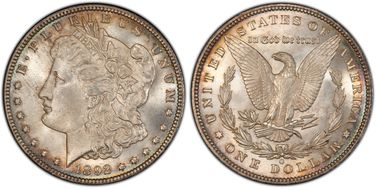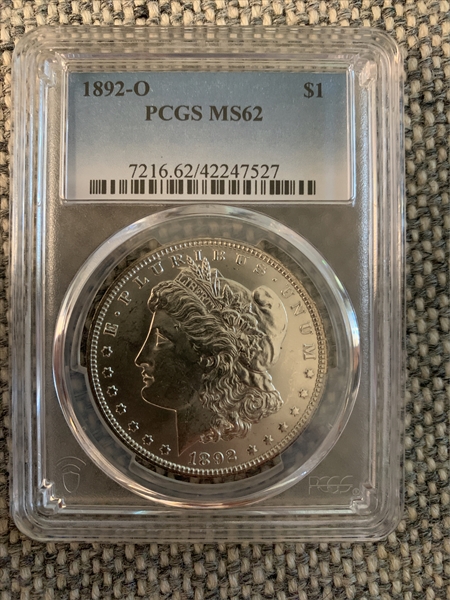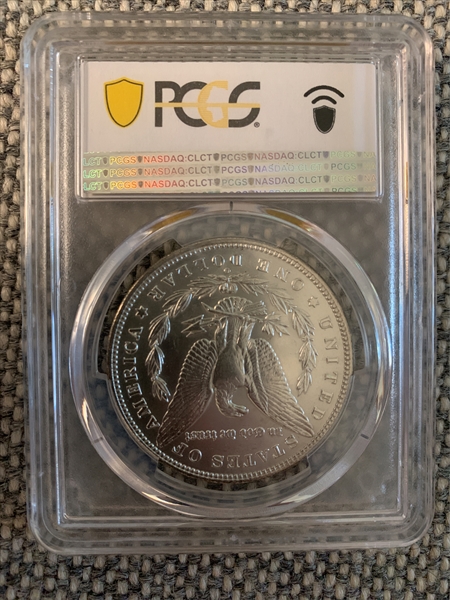1892-O $1 MS62 认证号42247527, PCGS号7216
专家评论
Q. David Bowers
The following narrative, with minor editing, is from my "Silver Dollars & Trade Dollars of the United States: A Complete Encyclopedia" (Wolfeboro, NH: Bowers and Merena Galleries, Inc., 1993)Hoard coins: The 1892-O dollar has always been available in Mint State on the coin market. For example, in 1910 a specimen sold at auction at $1.25, a common-date price. Generous quantities were released at and immediately following the time of mintage. In later years enough remained in numismatic circles that dollar specialists always had them in stock.
A few bags were released in the 1950s, from storage in the Treasury Building in Washington, D.C. However, the great deluge of this issue came during the unsealing in October 1962 of a vault in the Philadelphia Mint holding about 10 million Uncirculated New Orleans dollars. After that time, Harry J. Forman handled at least 20 bags and reported that the issue was very common in bag quantities, although the price never dipped much below about $5.00 per coin, and was more apt to be in the $7.50 to $12.50 range in the several years after 1964. Just before the October 1962 release, a typical Uncirculated coin was worth about $15.00.
The Redfield estate, auctioned by the Reno Probate Court in 1976, is said to have had two to four bags, with the coins heavily damaged by a counting machine used during the pre-auction appraisal. In 1977 a bag from another source, said to have contained numerous gems (see below), was dispersed. In the 1980s, Bowers and Merena Galleries handled a bag of 1892-O dollars from a Pennsylvania estate. Most coins in the group were in the range of about MS-62 to MS-63.
Circulated grades: In worn grades the 1892-O is very common.
Mint State grades: In Mint State the 1892-O is readily available. Most specimens are flat strikes with below average surfaces and lustre - not the kind of coins to excite anyone. Sharply struck gem coins in higher grades are rare, although Wayne Miller reported that in 1977 a bag of 1,000 coins contained many fully struck gems; most of these have been dispersed. Miller further stated this:
After the usual promotion to bring up bid levels these were doled out to a greedy public. Most of the gem 1892-O dollars on the market today are from this hoard. Because the 1892-O is often available in quantity it is another favorite of promoters. High current prices reflect the demand for fully struck gem pieces-flat struck and bagmarked pieces are worth significantly less.
Apart from the foregoing gems, striking quality is usually poor on the average specimen one is apt to find. Most surviving coins are lightly struck over Miss Liberty's ear and lack breast feathers on the eagle. In the hurry to coin as many dollars as possible with the smallest amount of effort, technicians at the New Orleans Mint spaced the dies too far apart. Among all Morgan dollars, the 1892-O is one of the most notorious for being flatly struck at the centers.
Most Uncirculated 1892-O dollars grade in the MS-60 to 62 range, and are common thus. Probably, 40,000 to 80,000 exist. MS-63 coins are likewise in plentiful supply, to the extent of 15,000 to 30,000 pieces. At the MS-64 level, 1892-O becomes scarce, and probably only 3,000 to 6,000 survive. In MS-65 the issue is rare; only an estimated 300 to 500 remain.
I do not know anything about the gem-laden bag of coins mentioned by Wayne Miller, apart from what he said about it. However, promotions notwithstanding, it seems that in view of the rarity of sharply struck coins in all grades and the rarity of MS-65 coins, anyone who paid a premium for such a coin in 1977 is sitting pretty now.
Prooflike coins: Prooflike 1892-O dollars are very rare, and even semi-prooflike coins are extremely hard to find. In the 15 years before 1982, Wayne Miller saw just eight prooflike specimens of this issue; two were barely Mint State and were very unattractive, one was well struck but quite bagmarked and not deeply mirrored; and four were deeply mirrored but were very flatly struck. Only a few DMPL cameo coins exist, one of which was in the Miller Collection. As of September 1992, NGC and PCGS certified just eight PL coins and only five DMPL. In the latter category, just one was better than MS-64. A "Proof' in the Jack Roe Collection (Mehl, 1945) brought $67.50; so described in Bolender's 183rd sale (1952), with the comment "Only two or three known," it realized $70. It has not been traced.
Caveat emptor: Most current market price listings for the 1892-O dollar are for sharply struck coins. However, the typical piece offered is apt to be flatly struck with poor lustre. Cherrypicking is strongly advised.
Varieties
Circulation strikes:
1. Normal date: Breen-5626. Open or closed 9.
VAM-7 is the Doubled Ear variety, which offers the bonus of having the date too far to the left, and with the 0 mintmark on the reverse double punched.
Dies prepared: Obverse: Unknown; Reverse: Unknown.
Circulation strike mintage: 2,744,000; Delivery figures by month: January: 120,000; February: 105,000; March: 140,000; April: 310,000; May: 300,000; June: 149,000; July: 150,000; August: 300,000; September: 300,000; October: 300,000; November: 270,000; December: 300,000.
Estimated quantity melted: Probably hundreds of thousands under the 1918 Pittman Act. Of course, there is no way of knowing how many, if indeed any, of a specific date met their fate in this manner.
Availability of prooflike coins: Prooflike coins are very rare, and DMPL coins are exceedingly rare. Most are flatly struck.
Characteristics of striking: Most specimens are very poorly struck with unsatisfactory lustre, However, sharply struck pieces do exist.
Known hoards of Mint State coins: A number of bags were released by the Treasury 1962-1964. A bag with many gem coins, probably from the preceding, was distributed in 1977. A further bag was broken up in Pennsylvania in the late 1980s.
Commentary
1892-O dollars are readily available in lower levels of Mint State, but most are poorly struck.
PCGS #
7216
设计师
George T. Morgan
边缘
Reeded
直径
38.10 毫米
重量
26.73 克
铸币数量
2744000
金属成分
90% Silver, 10% Copper
更高评级数量
6536
评级较低的钱币数量
2154
地区
The United States of America
价格指南
PCGS 数量报告
拍卖 - PCGS 评级的
拍卖 - NGC 评级的
稀有性和存量估计 了解更多
| 所有评级 | 275000 |
| 60或以上 | 100000 |
| 65或以上 | 625 |
| 所有评级 | R-1.8 |
| 60或以上 | R-2.0 |
| 65或以上 | R-5.7 |
| 所有评级 | 49 / 117 TIE |
| 60或以上 | 65 / 117 TIE |
| 65或以上 | 35 / 117 |
| 所有评级 | 49 / 117 TIE |
| 60或以上 | 65 / 117 TIE |
| 65或以上 | 35 / 117 |
状况普查 了解更多
 #1 MS67 PCGS grade
#1 MS67 PCGS grade
J. Colvin Randall, sold privately in 1894 - John M. Clapp Collection - John H. Clapp Collection, sold intact in 1942 - Louis E. Eliasberg, Sr. Collection - Bowers & Merena 4/1997:2289, $36,850 - Mike Gilley Collection - Arno Collection - Heritage 1/2009:5011, $57,500 - Sunnywood/Simpson Collection - Legend 10/2014:185, $111,625 |
 #2 MS66 PCGS grade
#2 MS66 PCGS grade
“Gold River” Collection |
| #2 MS66 PCGS grade |
| #2 MS66 PCGS grade |
| #2 MS66 PCGS grade |





















